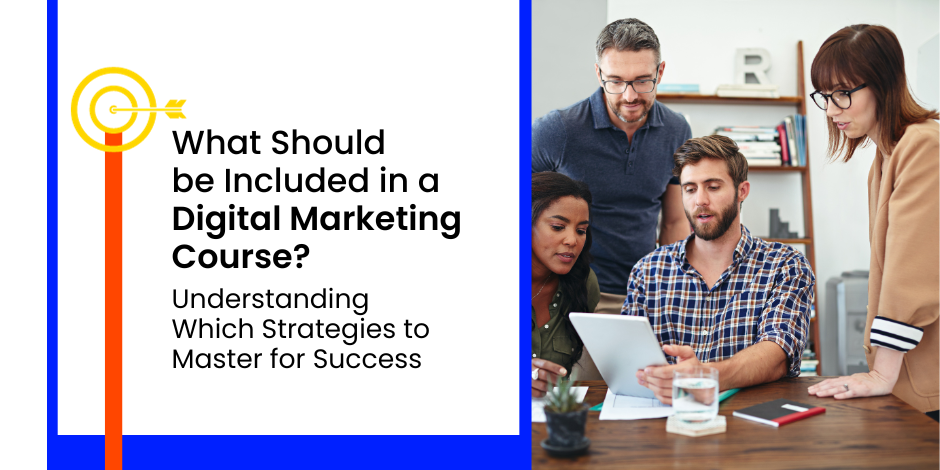What Should be Included in a Digital Marketing Course? Understanding Which Strategies to Master for Success

Stay Informed With Our Weekly Newsletter
Receive crucial updates on the ever-evolving landscape of technology and innovation.
Digital marketing has become vital to any successful business in today’s online-driven world.
We delve into the essential strategies, techniques, and insights that you should look out for when considering a digital marketing course.
We will explore the fundamentals of digital marketing and cover the key aspects crucial for anyone seeking to make a significant impact in the digital space.
Understanding the basics of digital marketing

Before diving into our guide on the specific strategies and techniques that should be included in a digital marketing course, let’s start by understanding digital marketing and why it matters.
Digital marketing uses channels like search engines, social media, email, and websites to reach and engage with potential customers.
It encompasses various activities and tactics to drive brand awareness, increase website traffic, and create leads and conversions.
Defining digital marketing: why it matters
At its core, digital marketing involves using various channels and platforms to connect with your target audience.
It’s about understanding how people interact with the internet and tailoring your marketing effectively.
With the rise of smartphones and the increasing internet accessibility, consumers now have instant access to a wealth of information at their fingertips.
As a result, capturing people’s attention these days requires more than traditional advertising.
The critical components of digital marketing
Several key components comprise a successful digital marketing strategy and a digital marketing course.
These include:
- Search Engine Optimisation (SEO): SEO involves optimizing content to enhance its visibility in search results.
- Content Marketing: Content marketing concentrates on creating relevant content to attract your target audience.
- Social Media Marketing: Social media platforms are vital in connecting with your audience.
- Email Marketing: Email marketing allows organizations to communicate directly with their audience through personalized and targeted emails.
Delving into SEO in a digital marketing course

SEO is vital in digital marketing by improving a website’s visibility and driving organic traffic.
With the right SEO strategies, businesses can significantly enhance their online presence and increase their chances of attracting potential customers.
The importance of SEO in digital marketing
SEO is essential because it helps search engines understand your website and rank it higher in results.
When your website appears on the first page of search results, it increases visibility and credibility, improving the likelihood of attracting organic traffic.
By optimizing your website for relevant keywords and providing high-quality content, you can boost your chances of appearing at the top of search engine results pages.
This visibility can lead to more website visits, higher conversions, and business growth.
Strategies for effective SEO
There are several strategies that you can employ to improve your website’s SEO:
- Keyword Research: Identify relevant keywords and phrases your target audience is searching for.
- On-Page Optimisation: Ensure your website pages are optimized with meta tags, headings, and alt tags.
- Content Creation: Create high-quality and useful content that addresses the requirements and interests of your target audience.
- Link Building: Build high-quality inbound links from reputable websites to improve your website’s authority and credibility.
Mastering Content Marketing
Understanding content marketing is integral to a digital marketing course and any digital marketing strategy.
By creating and distributing valuable and relevant content, businesses can attract and engage their target audience, build brand awareness, and drive conversions.
The role of content in digital marketing
Content is what drives digital marketing.
It helps businesses establish authority, build trust with their audience, and nurture long-term relationships.
Companies can position themselves as industry authorities and drive organic website traffic by creating valuable and relevant content.
Content comes in various formats, including articles, blog posts, videos, infographics, and podcasts.
The key is to cater to the preferences of your target audience and provide them with valuable information they are seeking to find.
Creating compelling content: Tips and techniques
Creating compelling content requires profoundly understanding your target audience and their needs.
Here are some tips and techniques to help you create content that resonates with your audience:
- Understand your audience: Conduct market research to determine your target audience’s demographics, interests, and pain points.
- Tell stories: Incorporate storytelling techniques into your content to capture your audience and create an emotional connection.
- Use visuals: Include visually appealing elements such as videos, images, and infographics to enhance your content and make it more engaging.
- Provide value: Focus on providing valuable information and insights that your audience can benefit from.
The power of social media marketing
Social media has transformed the way businesses communicate with their audience.
With billions of users on various social media platforms, it has become a vital channel for companies to reach, engage, and build relationships with their target audience.
Therefore, it is essential to understand that you cover social media in your digital marketing course so that it can inform your digital marketing strategy.
The impact of social media on digital marketing
Social media platforms provide organizations with an unprecedented opportunity to connect with their target audience personally.
By leveraging social media, companies can build brand awareness, drive website traffic, and foster meaningful customer conversations.
One of the significant advantages of social media marketing is its ability to target demographics and interests.
Best practices for social media marketing
To make the most of social media marketing, consider these best practices:
- Develop a strategy: Clearly define your goals, target audience, and critical messages.
- Create engaging content: Use a combination of content formats such as images, videos, and infographics to capture your audience’s attention.
- Monitor your results: Regularly track your social media performance using analytics tools.
- Engage with your audience: Respond promptly to comments, messages, and mentions.
Exploring email marketing and its importance in a digital marketing course

Email marketing has been utilized in digital marketing for years, so it’s important that the digital marketing course you choose covers this topic.
Email marketing continues to be one of the most effective ways to engage with your audience and drive conversions.
The importance of email marketing
Email marketing allows companies to communicate with their audience in a personalized and targeted manner.
It is highly effective in nurturing leads, driving conversions, and building long-term customer loyalty.
With email marketing, businesses can deliver tailored messages and offers to their subscribers, providing relevant content that meets their needs and interests.
This level of personalization helps foster stronger relationships and improves the chances of conversion and engagement.
Crafting effective email marketing campaigns
To ensure your email marketing campaigns are successful, consider these tips:
- Build a quality email list: Focus on quality over quantity when creating your email list.
Encourage sign-ups through your website, social media, and other touchpoints. Segment your list based on demographics, behavior, or interests to personalize your messages further. - Create compelling subject lines: Grab the attention of your subscribers with engaging and concise subject lines. Personalize the subject lines whenever possible to increase open rates.
- Deliver valuable content: Provide valuable information, offers, and exclusive content to your subscribers. Aim to solve their issues or address their pain points to keep them engaged and interested in your emails.
- Test and optimize: Test different aspects of your email campaigns, such as subject lines, send times, and call-to-action buttons.
Analyze the results and optimize your campaigns based on what resonates the most with your audience.
Conclusion
Digital marketing is an ever-evolving field.
By mastering the critical components of digital marketing and implementing effective strategies, you can position yourself for success in the online landscape.
Whether it’s search engine optimization, content marketing, social media marketing, or email marketing, each tactic is crucial in helping businesses reach and engage with their target audience.
Are you ready to launch your career in digital marketing?
If so, we encourage you to explore the Institute of Data’s Digital Marketing & Artificial Intelligence program.
Alternatively, we invite you to book a complimentary call with a member of our team to discuss the Digital Marketing program in more detail.




